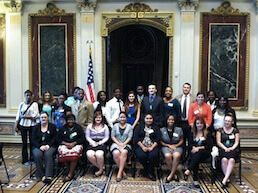The House Ways and Means Subcommittee on Human Resources heard testimony yesterday on the disproportionate use of psychotropic medications on foster youths, and the president’s $750 million proposal to address the issue.
The hearing yesterday was spurred along by the presence of a celebrity witness, talk show host “Dr. Phil” McGraw.
“These drugs can change and even save lives,” McGraw told the committee. But with foster youths, they are “too often misused as chemical straitjackets,” prescribed to mitigate “undesirable behavior” and make foster youths “less inconvenient.”
The use of psychotropics on foster youths has received attention from several corners in both houses of Congress and the White House in recent months. President Barack Obama proposed in his fiscal 2015 budget a $750 million, 10-year plan to help states develop different ways to address mental health challenges among foster youths.
Last week, Democrats on the Senate Finance Committee said the committee plans to “play offense” on what Sen. Tom Carper (D-Del.) called “mind-bending drugs.”

67 youth gathered in Washington for Foster Youth Shadow Day. Dr. Phil, in town to address them, told a Congressional Committee that psychotropic drugs were too often used as “chemical straitjackets” on foster youth
Ways and Means leadership from both parties asserted an interest in addressing the issue. “This is a bipartisan issue,” said Subcommittee Chairman David Reichert, “We are together on this.”
A 2011 law shepherded through Ways and Means required states to share their prescription and monitoring protocols with the Administration for Children and Families (ACF), a division of the Department of Health and Human Services.
“Everyone agrees that these drugs are flowing too much,” McGraw said. “The real question is, why? Why is this happening?”
The president’s proposal is a two-pronged plan that focuses mostly on building the ability of states to treat foster youths without psychotropic drugs – or at least with less drugs – and then rewarding states for lowering reliance on the drugs.
The first part is a $50 million a year, five-year investment by the Administration for Children and Families (ACF). That mandatory spending would “encourage the use of evidence-based screening, assessment and treatment of trauma and mental health disorders” among foster youth.
The second part is a $500 million Medicaid demonstration program that would provide performance-based Medicaid incentive payments to improve care coordination and delivery of evidence-based services for foster youth.
One key element of those demonstrations would be improved collaboration between child welfare and health services agencies.
“You’d think that child welfare and mental health systems would work together a lot; you’d be very wrong,” said Dr. Michael Naylor, who helps lead a medication oversight partnership between the University of Illinois-Chicago and the Illinois Department of Children and Family Services.
ACF official Joo Yuen Chang testified that the agency found a services gap as it engaged more local systems about psychiatric medications.
“Child welfare agencies did not have access to the research-based, non-pharmacological, mental health treatments for the conditions for which many of these children were being medicated,” Chang said at the hearing.
The Dr. Phil Foundation is one of the 110 organizations to sign a letter in support of the Obama proposal, which ranking minority member Lloyd Doggett (D-Texas) introduced for the record.
But McGraw also suggested a more nefarious reason for overreliance on medications.
“It’s pay for pathology,” said McGraw, who is also a spokesman for Court Appointed Special Advocates. “More prescriptions, less treatment. More prescriptions, less treatment. These children deserve better than that.”
The hearing room was filled with attendees of Foster Youth Shadow Day, an event in which foster youths are paired with congressman for the day. About 60 of those youths – donning bright blue, graduation-style stoles – attended the hearing, and received applause at the outset.
Twenty-one-year-old Dawna Zender Hovenier, a former foster youth, testified that she was diagnosed with Borderline Personality Disorder and spent seven months locked in a psychiatric hospital.
“The seven months I was locked up and forced to take drugs against my will felt like being jail,” said Hovenier, who is now a youth advocate for Washington State nonprofit The Mockingbird Society.
Hovenier’s adoptive father helped her phase all of the drugs out. Reviewing her own records, she discovered the system was had spent $120,000 on her during her stay in the hospital.
“It makes me very angry,” Hovenier said. She recommended that Congress grant every foster youth the right to demand a second opinion on psychotropic prescriptions.
John Kelly is the editor-in-chief of The Imprint

